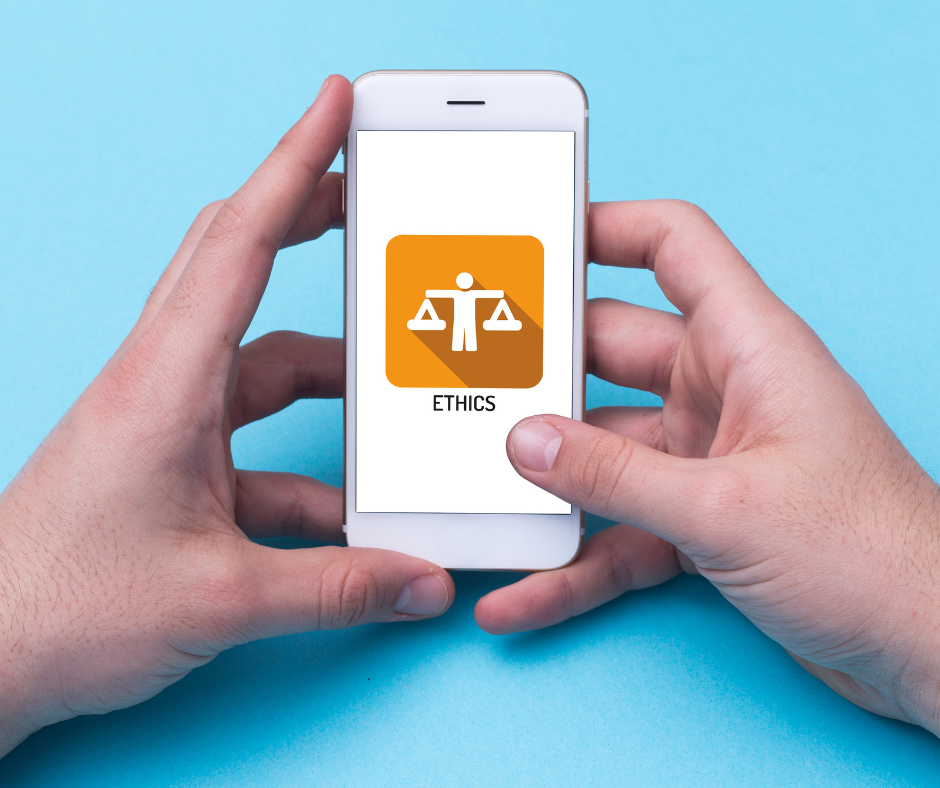
In today’s increasingly competitive and socially conscious business landscape, companies must stand out not only with their products and services but also through their commitment to ethical behavior. A well-crafted ethical policy serves as a beacon, guiding employees and stakeholders towards a shared vision of integrity, responsibility, and transparency. But how does one create an effective ethical policy that truly reflects a company’s values and principles? Let’s embark on a journey to explore the components and ethical policy example, as well as the steps to craft an ethical policy that fosters a culture of integrity and success.
Key Takeaways
- Ethical policies are documents that outline company values and principles, a code of conduct, and compliance with legal requirements to promote integrity.
- Companies must regularly review their ethical policy to ensure alignment with mission statement & core values, consult stakeholders for feedback & analyze industry trends.
- Implementation requires effective communication/training plus reporting mechanisms. Regular reviews and updates should also be conducted.
Understanding Ethical Policies
Ethical policies provide the foundation for a company’s commitment to integrity, guiding employee behavior and decision-making in line with organizational values and principles. These policies serve as a compass, ensuring that companies maintain a positive reputation while fostering a culture of integrity and fairness.
The adoption of ethical policies goes beyond mere compliance with laws and regulations. They help create a healthy work environment, where employees treat each other with respect and fairness, regardless of their mental and physical ability or family status.
Moreover, ethical policies act as a deterrent against potential misconduct, such as misusing company resources or company property for personal gain, engaging in conflicts of interest, or violating intellectual property rights. These policies are a crucial aspect of maintaining business ethics within an organization, and any violation of these policies is strictly prohibited.

Definition and Purpose
An ethical policy is a document outlining a company’s values, principles, and expectations for employee behavior. This policy serves as a guide for decision-making, reflecting the company’s mission and goals, and nurturing a culture of integrity. The development of ethical policies fosters a trustworthy and responsible organization, equipping employees with the knowledge and resources for ethically sound decision-making.
Notable companies such as Google, Starbucks, and Johnson & Johnson have implemented ethical policies that demonstrate their commitment to ethical behavior and social responsibility. These policies serve as a testament to the importance of ethical policies in upholding a company’s reputation and fostering a positive work environment.
Importance of Ethical Policies
In the complex landscape of business conduct, ethical policies assume a significant role. They help maintain a company’s positive reputation by attracting customers and employees who share the organization’s values. Furthermore, a well-crafted ethical policy ensures compliance with legal and regulatory requirements, mitigating the risk of penalties and sanctions.
A code of conduct, an essential component of ethical policies, serves as a roadmap for employee behavior, outlining specific expectations in line with the company’s values and principles. By adhering to a code of conduct, employees contribute to upholding the company’s reputation, fostering a culture of integrity, and promoting ethical decision-making.
Best Buy Code of Ethics
The Best Buy Code of Ethics serves as a foundational framework that delineates the principles and standards guiding the conduct of employees within the organization. Established to foster a culture of integrity and responsibility, the Best Buy Code of Ethics outlines the expectations regarding ethical behavior, compliance with laws and regulations, and upholding the highest standards of honesty in all interactions. This code underscores the importance of respecting diversity, promoting inclusivity, and maintaining a safe and inclusive workplace. It also emphasizes the obligation to prioritize customer satisfaction and uphold confidentiality while encouraging open communication and collaboration within the company. Best Buy’s commitment to adhering to this code ensures a transparent and accountable approach to business operations, enhancing trust and credibility with both employees and stakeholders.
Key Components of an Ethical Policy

An effective ethical policy is built upon three key components: company values and principles, a code of conduct, and compliance with legal and regulatory requirements. These components work in tandem to create a comprehensive framework that guides employee behavior and decision-making, ensuring alignment with the organization’s overall mission and goals.
A robust ethical policy that reflects a company’s values and principles, as well as guides employees in ethical behavior, can be created by addressing these components. This, in turn, fosters a culture of integrity and accountability, contributing to the company’s long-term success and reputation.
Company Values and Principles
Company values and ethical principles form the bedrock of an ethical policy, guiding employee actions and decisions in accordance with the organization’s mission and objectives. They help create a shared understanding of what is considered ethical behavior and reinforce the company’s commitment to upholding its values in all aspects of its operations.
A company’s ethical policy can be kept aligned with its mission statement and core values by regularly reviewing and updating these values in response to evolving industry trends, stakeholder expectations, and the company’s direction. This continuous alignment process helps maintain the relevance and effectiveness of the ethical policy, ensuring that it remains a guiding force for ethical behavior within the organization.
Code of Conduct
A business code of conduct provides specific guidelines for employee behavior, addressing topics such as communication, treatment of others, and adherence to internal and external policies. This detailed roadmap helps employees navigate the intricacies of ethical behavior, ensuring that they act in line with the company’s values and principles at all times, demonstrating professional behavior and adhering to the professional code.
A culture of integrity, accountability, and professional competence can be fostered by implementing a code of ethical conduct that is clear, concise, and accessible to all employees. Regular training and reinforcement of the code of conduct ensure that employees remain aware of their ethical responsibilities and are equipped with the necessary knowledge and resources to make ethically sound decisions.
Compliance and Legal Requirements
An ethical policy significantly encompasses compliance with legal and regulatory requirements. Ensuring that the company operates within the bounds of the law helps avoid potential penalties and sanctions, while also demonstrating the organization’s commitment to responsible business practices.
To maintain compliance, companies should regularly review and update their ethical policies to reflect changes in the legal and regulatory environment. This ongoing process helps to ensure that the company’s ethical policy remains current, effective, and in alignment with evolving industry standards, thereby safeguarding the organization’s reputation and long-term success.
Code of Conduct Examples
Code of conduct examples provide valuable insights into acceptable behavior and expectations within various settings, such as workplaces, online communities, or social groups. These examples delineate the principles and guidelines that individuals are expected to follow to maintain a respectful and inclusive environment. In a professional setting, a code of conduct might emphasize collaboration, communication, and ethical decision-making, aiming to foster a positive work culture. Online platforms often establish clear codes of conduct to ensure respectful dialogue, discourage hate speech, and promote constructive interactions among users. Educational institutions also employ code of conduct examples to guide students and staff in their behavior, encouraging academic integrity, fairness, and mutual respect. These examples serve as essential tools for setting the tone and standards for appropriate conduct within a specific context.
Examples of Ethical Policies from Leading Companies

Leading companies such as Google, Starbucks, and Johnson & Johnson provide examples of strong ethical policies that emphasize their commitment to integrity, transparency, and social responsibility. These companies understand the importance of having a well-crafted ethical policy in place, as it serves as a guiding force for their employees and stakeholders, shaping their culture and reinforcing their values.
Valuable insights into the components and strategies that contribute to the creation of a robust and effective ethical policy can be gained by examining these leading companies’ ethical policies. This, in turn, can inspire and inform the development of ethical policies for other organizations, ensuring that they too can foster a culture of integrity, accountability, and success.
Google’s ethical policy focuses on transparency, user privacy, and responsible innovation. The tech giant is committed to ethical technology development and building trust with its users, ensuring that its products and services are designed with privacy, security, and user-centricity in mind.
Google’s emphasis on transparency, privacy, and responsible innovation demonstrates the company’s dedication to upholding its values and principles, while also addressing emerging ethical concerns in the rapidly evolving tech industry. This commitment to ethical behavior and adherence to a robust ethical policy has helped Google maintain its reputation as a leader in the technology world, inspiring trust and loyalty among its users.
Starbucks
Starbucks’ ethical policy emphasizes social responsibility, environmental stewardship, and fair treatment of employees, suppliers, and customers. The coffee giant is committed to creating a positive impact on people and the planet, ensuring that its business practices reflect its values and contribute to a sustainable future.
Through initiatives such as the Supplier Code of Conduct, the Coffee and Farmer Equity (C.A.F.E.) program, and a commitment to creating a work environment free of harassment, Starbucks’ ethical policy demonstrates the company’s dedication to upholding its values and principles in all aspects of its operations.
By fostering a culture of integrity and social responsibility, Starbucks has established itself as a leader in the global coffee industry, inspiring trust and loyalty among its customers and stakeholders.
Johnson & Johnson
Johnson & Johnson’s ethical policy, known as “Our Credo,” outlines the company’s commitment to the well-being of patients, employees, communities, and the environment. This policy emphasizes the importance of integrity, innovation, and collaboration, ensuring that the company’s actions align with its mission to improve human health and well-being.
Through its dedication to ethical behavior and adherence to “Our Credo,” Johnson & Johnson has maintained its reputation as a leader in the healthcare industry. The company’s ethical policy serves as a guiding force for its employees, ensuring that they act in the best interests of:
- the patients
- doctors
- nurses
- other individuals who rely on their products and services
This commitment to ethical behavior and social responsibility has helped Johnson & Johnson maintain trust with its stakeholders and contribute to its long-term success.
Steps to Create an Effective Ethical Policy

The process of creating an effective ethical policy involves a series of steps aimed at aligning the policy with the organization’s goals and values. These steps include:
- Reviewing the company’s mission statement and core values
- Consulting stakeholders
- Analyzing past issues and industry trends
- Drafting and revising the policy
By following these steps, companies can create an ethical policy that effectively guides employee behavior and decision-making, fostering a culture of integrity and accountability.
The process of creating an effective ethical policy requires ongoing attention and effort. It is essential to regularly review and update the policy to ensure its ongoing relevance and effectiveness. By engaging in this continuous process, companies can:
- Maintain a strong ethical stance
- Adapt to emerging issues and evolving industry standards
- Ensure that their employees continue to act in accordance with the organization’s values and principles
Review Mission Statement and Core Values
A company’s mission statement and core values serve as the foundation for its ethical policy, providing a clear direction and purpose for the organization. Reviewing these elements helps ensure that the ethical policy aligns with the company’s overall goals and objectives, fostering a culture of integrity and ethical behavior.
The relevance and effectiveness of the ethical policy can be maintained on a day to day basis by regularly reviewing and updating the mission statement and core values. As industry trends and stakeholder expectations evolve, it is crucial to ensure that the company’s values and principles remain aligned with its mission and goals.
This ongoing alignment process helps to create a strong ethical policy that guides employee behavior and decision-making, contributing to the company’s long-term success.
Consult Stakeholders
Valuable input and insights to help shape the ethical policy can be provided by consulting stakeholders, such as employees, customers, suppliers, and business partners. By involving these key stakeholders in the policy development process, companies can ensure that the policy addresses their concerns and expectations, fostering trust and collaboration.
Engaging stakeholders in the development of an ethical policy has several benefits:
- It helps to create a more robust and effective policy.
- It promotes a sense of ownership and responsibility among employees and other stakeholders.
- This sense of ownership can lead to increased adherence to the ethical policy.
- Ultimately, this contributes to the company’s success and reputation.
Analyze Past Issues and Industry Trends
Potential areas of concern can be identified and the development of the ethical policy can be informed by analyzing past issues and industry trends. By examining previous ethical incidents and understanding the factors that led to them, companies can develop policies and guidelines that address these issues and promote ethical behavior.
Furthermore, analyzing industry trends can provide insights into emerging ethical challenges and best practices, allowing companies to proactively address these issues and stay ahead of the curve. By incorporating lessons learned from past issues and industry trends into the ethical policy, companies can create a comprehensive and proactive policy that guides employee behavior and fosters a culture of integrity and accountability.
Draft and Revise the Ethical Policy
The development process involves a crucial step of drafting and revising the ethical policy to ensure its comprehensiveness, clarity, and alignment with the company’s values and goals. Creating an initial draft of the policy provides a starting point for further refinement and revision, allowing stakeholders to provide input and feedback, helping shape the final policy.
Revising the ethical policy involves refining the language, addressing stakeholder feedback, and ensuring that the policy remains aligned with the company’s mission and values. This iterative process helps to create a robust and effective ethical policy that guides employee behavior and decision-making while adapting to evolving industry standards and emerging ethical concerns.
Implementing and Enforcing an Ethical Policy

Promoting a culture of integrity and accountability within an organization greatly involves the implementation and enforcement of an ethical policy. This process involves:
- Effective communication and training
- Reporting mechanisms for potential violations
- Regular review and updates to ensure ongoing relevance and effectiveness
By actively engaging in these activities, companies can ensure that their ethical policies are understood, respected, and adhered to by employees and stakeholders alike.
The success of an ethical policy relies heavily on the organization’s commitment to upholding and enforcing its values and principles. By investing in the implementation and enforcement of the ethical policy, companies can create a strong foundation for ethical behavior and decision-making, ultimately contributing to the organization’s overall success and reputation.
Communication and Training

To ensure that employees understand and adhere to the ethical policy, effective communication and training play a key role. Providing employees with the necessary knowledge, resources, and support to navigate ethical dilemmas and make sound decisions is crucial for fostering a culture of integrity and accountability.
Ongoing reinforcement of the ethical policy through company-wide messaging and targeted training programs helps maintain employee awareness and commitment to upholding the company’s values and principles. By investing in communication and training, companies can create an environment where ethical behavior is the norm, and employees are empowered to make decisions that align with the organization’s goals and values.
Reporting Mechanisms
Employees are provided with means to report potential violations of the ethical policy without fear of retaliation through reporting mechanisms, such as anonymous hotlines or designated contact persons. These mechanisms help to create an environment where employees feel supported and encouraged to voice their concerns, fostering a culture of openness and accountability, and ensuring proper reporting violations management.
Establishing effective reporting mechanisms is a crucial component of enforcing an ethical policy. By providing employees with a confidential avenue for reporting ethical concerns, companies demonstrate their commitment to upholding their values and principles and addressing potential violations. This, in turn, helps to maintain trust and integrity within the organization, contributing to its long-term success and reputation.
Regular Review and Updates
By regularly reviewing and updating the ethical policy, its relevance and effectiveness in addressing emerging issues and evolving industry standards can be ensured. By periodically revisiting and refining the policy, companies can proactively address changing ethical concerns and maintain a culture of integrity and accountability that supports the organization’s long-term success.
Code of Conduct Violations
Code of conduct violations refer to breaches or infractions of the established rules and guidelines within an organization, community, or social setting. These violations can encompass a wide range of actions that deviate from the expected ethical, behavioral, or professional standards outlined in the code of conduct. Examples may include harassment, discrimination, dishonesty, misuse of resources, or any actions that create a hostile or toxic environment. Addressing code of conduct violations is crucial for maintaining a healthy and respectful atmosphere within the group or institution. Effective handling of such violations typically involves a well-defined reporting mechanism, thorough investigation, appropriate disciplinary actions, and educational efforts to prevent future occurrences.
Summary
In conclusion, crafting an effective ethical policy is a vital aspect of fostering a culture of integrity and accountability within an organization. By understanding the key components of an ethical policy, learning from leading companies, and following the steps to create a comprehensive and proactive policy, businesses can successfully navigate the complex landscape of ethical behavior and decision-making. By committing to upholding their values and principles, companies can create a strong foundation for long-term success and a positive impact on the world.
Frequently Asked Questions
What is ethics policy?
An ethics policy, also known as a code of ethics, outlines the expected conduct of employees in the workplace, and helps make businesses more attractive to potential candidates.
What should an ethical policy include?
A code of ethics should set out an organization’s ethical guidelines and best practices to ensure honesty, integrity, and professionalism. It should identify the key values and principles that guide the business such as honesty, integrity, fairness, respect, and responsibility. Additionally, it should detail guiding principles, define ethical behavior, outline procedures for reporting violations and potential disciplinary actions, and include the six universal moral values such as trustworthiness, respect, responsibility, fairness, kindness, and good citizenship.
What is an example of ethical example?
Adhering to standards that prevent the harms of rape, stealing, murder, assault, slander, and fraud and upholding virtues such as honesty, compassion, and loyalty is an example of ethical behaviour.
What are the 5 principles of ethical policy?
Ethical leadership is based on five core principles: respect, service, honesty, justice and community. Autonomy, justice, beneficence, non-maleficence, and fidelity are also essential elements of ethical leadership.
What is the purpose of an ethical policy?
An ethical policy is essential for providing guidance to employees and sustaining a favorable reputation, reflecting the company values and principles and cultivating a culture of integrity.